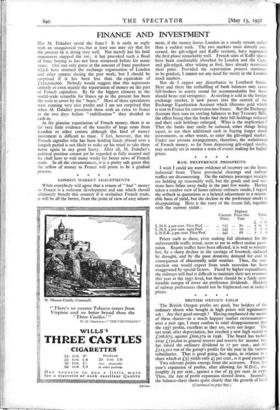LONDON MARKET ADJUSTMENTS While everybody will agree that a return
of " bad " money to France is a welcome development and one which should ultimately benefit this country if it revitalises French trade, it will be all the better, from the point of view of easy adjust- ment, if the money leaves London in a steady stream rather than a sudden rush. The two markets most directly con- cerned, the gilt-edged and Kaffir sections, have negotiated the first phase remarkably well. French sales of Kaffir shares have been comfortably absorbed by London and the Cape, and gilt-edged, after wilting at first, have already recovered their poise. Provided the repatriation process continues to be gradual, I cannot see any need for worry in the London stock markets.
Nor do I expect any disturbance in Lombard Street. Here and there the reshuffling of bank balances may cause bill-brokers to scurry round for accommodation but there should be no real stringency. As sterling is sold in the foreign exchange market, it now passes into the control of the Exchange Equalisation Account which liberates gold which is sent to France for conversion into francs. But the Exchange Account then uses its sterling balances to buy Treasury Bills, the effect being that the banks find their bill holdings reduced and their cash holdings enlarged. What is the implication ? That the banks may easily be induced, other things being equal, to use their additional cash in buying longer dated investments, in other words, to enter the gilt-edged market. Under our present arrangements, therefore, the withdrawal of French money, so far from depressing gilt-edged stocks, may actually set in motion a train of events making for higher prices.














































 Previous page
Previous page